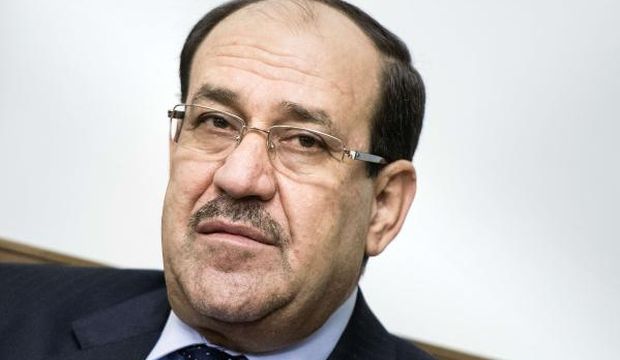
This file picture taken on June 23, 2014 shows former Iraqi prime minister Nuri Al-Maliki meeting with US Secretary of State John Kerry (unseen) at the Prime Minister’s Office in Baghdad. (AFP Photo/Pool/Brendan Smialowski)
Baghdad, Asharq Al-Awsat—Former Iraqi prime minister Nuri Al-Maliki on Tuesday rejected a report implicating him in the fall of Iraq’s second city Mosul to the Islamic State of Iraq and Syria (ISIS) in June 2014.
In a post on his official Facebook page, Maliki said the findings of the parliamentary panel tasked with producing the report had “no value” and that the panel was “neither objective nor impartial.”
He accused Turkey and the Kurds of being involved in the city’s fall, adding that “what happened in Mosul was a conspiracy planned in Ankara, then the conspiracy moved to Erbil.”
The report, which was referred to Iraq’s judiciary by parliament on Monday, calls for Maliki and other officials to face trial over their role in the fall of Mosul to ISIS. It alleges that Maliki knowingly appointed commanders in the city engaged in corruption and who subsequently failed to accurately inform him of the true extent of the ISIS threat.
Maliki, who has been in Iran since Monday when the announcement on the panel’s findings was made, was also removed from his post as one of Iraq’s three vice presidents last week after the posts were canceled as part of a push by Iraq’s Prime Minister Haider Al-Abadi to trim a plethora of official positions based on sectarian lines and reduce corruption in political circles.
An informed Iraqi political source, speaking on condition of anonymity, told Asharq Al-Awsat Maliki was now “beginning to lose many choices for maneuver” in Iraq’s political circles following the cancelation of his vice presidential post.
“The situation is different for Maliki than for the other two vice presidents, Osama Al-Nujaifi and Iyad Allawi,” the source said. He added that both men, unlike Maliki, had stopped using the title in official statements, and that Nujaifi at least, “perhaps to spite Maliki,” had come out publicly to support Abadi’s move to cancel the posts.
Maliki’s removal from his post and his opposition to Abadi’s reforms puts him at loggerheads with the current PM and the Islamic Da’wa Party over which Abadi now presides, despite Maliki being a member of the party, the source said.
“Even if Maliki manages to return to parliament—though this in itself is highly unlikely from a legal point of view—he would be nothing more than a mere MP . . . and this will not be enough for someone who wanted to remain in the limelight through seeking a third term in office [in 2014],” the source added.
Some reports from Baghdad have suggested Maliki intends to remain in Iran following the referral of the Mosul report to Iraq’s judiciary and the possibility of his facing trial. But the source said Maliki would most likely return to Iraq on Thursday.
“If he does not return or delays his return beyond this point, then it will be the end of his political career in Iraq, and this is something Maliki will not allow to happen so easily.”
Further cuts
On Sunday Abadi made further cuts to government posts, removing 11 posts from his cabinet, which brings the total number to 22.
A statement from Abadi’s office warned “those with privileges or who are corrupt and attempting to block the reforms” that there was “no turning back” from the path set by the PM.
The statement added however that those removed from their posts were “not necessarily accused of corruption” and that the move was simply part of the reforms announced last week.
On Tuesday Abadi also canceled the posts of advisers hired as contractors to various ministries. He limited such posts to five each for himself, Iraq’s president, and the parliament speaker.
Manaf Al-Obaidi contributed additional reporting from Baghdad.
